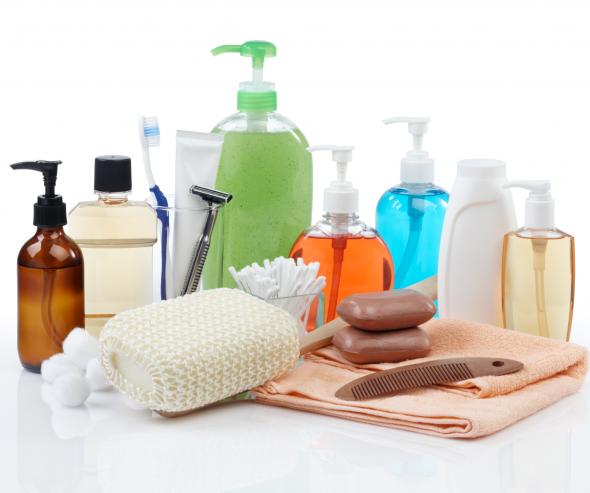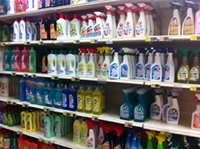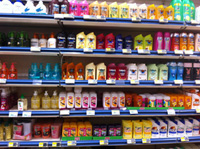The Autorité de la concurrence fines concerted practices between manufacturers a total of 345,2 € millions and 605,9 € millions on each market concerned

The Autorité de la concurrence issues today a decision whereby it fines home care and personal care manufacturers for having implemented concerted practices. Between 2003 and 2006, on both markets, they coordinated their commercial policy towards supermarkets, and in particular their price increases.
These two fines rank among the most significant fines pronounced by the Autorité de la concurrence, until now.
> See information sheet 1 : the most important fines issued by the Autorité (French version)
|
A case originated from the leniency programme
The Autorité de la concurrence was informed of the existence of these concerted practices by SC Johnson, Colgate-Palmolive and Henkel which successively applied to benefit from the leniency procedure.
The leniency procedure allows a company which informs the Autorité de la concurrence of anticompetitive practices in which it takes or took part, to benefit from a full or partial immunity from fines, under certain conditions in particular on the basis of the rank of arrival of its leniency application, the ‘added value’ of the information given as well as its full cooperation with the Autorité to establish the existence of the infringement (more about the leniency procedure - in French).
> See information sheet 2 : the leniency programme and the former cases (French version)
Arrival rank for each of the concerted practices :
| Rank | Home care products | Personal care products |
| 1 | SC Johnson | Colgate-Palmolive |
| 2 | Colgate-Palmolive | Henkel |
| 3 | Henkel | - |
The products concerned
 |
Home care products They account for a significant share of current French households spending. In 2006, the turnover of this market amounted €4.2 billion. In this market which is largely dominated by brands than cannot be overlooked, the 8 first firms operating in the sector represent about 70% of the sector turnover. The products concerned were for example : fabric softeners (Cajoline, Soupline, etc.), stain removers (Vanish, K2R), hand dishwashing detergents, (Paic, Palmolive, Mir, etc.), dishwashers tabs (Sun, Calgonit, etc.), household cleaners (Ajax, Mr Propre, Cif, Saint-Marc, Cillit Bang, etc.), WC products (Harpic, Canard WC, Bref, etc.), air fresheners or insect killers. > The full list of the products concerned is available in the decision (see pp. 229 and 230) |
 |
Personal care products At the time of the practices, the French spent an average of 190 euros per year for personal care products. The total turnover of the personal care sector exceeded 5 billion euros in France. The market is characterized by the presence of a limited number of global players. The top 8 players in the market represent over 70 % of the overall industry turnover, the first three totalling approximately 43 % of the market (of which more than 28% on average for the group leader L’Oréal).
> The full list of the products concerned is available in the decision (see pp. 233 and 234) |
Raids during lunchtime at "Le Royal Villiers " restaurant in Paris
Thanks to information disclosed by the first leniency applicants, raids were carried out in France in February and July 2006. They allowed to gather many evidence (minutes of meetings, agendas, memos, notes taken during meetings, booking vouchers, etc.).
The very first raid even occurred during a lunch organised in a Parisian restaurant called “le Royal Villiers”. Some of the players (Colgate-Palmolive , SC Johnson, Henkel, Bolton Solitaire and Sara Lee) were caught in act.
Secrete “clubs” on pricing policies
- The legal framework
At the time of the practices, commercial relationships between suppliers and distributors were governed by the "Galland" Law, which in fact had led to a real " inflationary spiral " by restricting competition between market players.
To remedy these effects and obtain cheaper prices for consumers, public authorities then sought to modify this framework on three occasions during the period 2003-2005 (Dutreil circular of 16 May 2003, Commitment for a sustainable reduction of consumer prices of 17 June 2004 - Dutreil law of 2 August 2005).
Confronted with this new legal context, the supermarket suppliers for home and personal care products coordinated their commercial policy towards their distributors, to avoid any increase of competition between them.
> See information sheet 3 about the changes in the legal Framework
- The « Team » and « Friends » clubs
The concerted practices were particularly sophisticated. They led to convergence in behaviours concerning the main elements of commercial negotiations between all main suppliers for home care and personal care products. To discuss about each sector, they met regularly and secretly to coordinate their commercial policies and discuss their pricing policies.
Undertakings coordinated during meetings that took place in different “clubs” called "Team " or "Friends", where commercial managers or sales managers met. The meetings took place in restaurants, in addition, they exchanged also correspondence at their private homes. These exchanges were supplemented by bilateral or multilateral contacts, including phone calls, which allowed companies to strengthen the exchanges initiated within the clubs.
- Information sharing was aiming at price convergence
The collusive practices were intended to bring together the positions held by suppliers during the commercial negotiations with distributors. They allowed suppliers to better adapt their proposals, with the assurance that they would never find themselves disadvantaged and isolated during the business negotiations vis-à-vis the distributors/buyers.
Information was thus shared before the negotiations with the distributors, each supplier disclosing/revealing its strategy concerning price increases and remuneration paid for the commercial cooperation services.
> Example of handwritten notes taken during one of these meetings by a Henkel commercial manager.
Henkel commented as follows:
"(...) The participants shared information on the future overall price increases, as the table shows:
The first column "how much" indicates in percentage the overall price increases;
The second column " when " indicates the effective date for the increase ;
The third "" column smoothing indicates the period during which retailers can still purchase the products at the previous price;
The fourth column indicates the date taken into account to actually calculate price increase index mentioned in the fifth column . (...) "(Paragraph 494 of the decision)

In the personal care sector, these meetings also allowed participants to develop a common bargaining strategy and to prepare together arguments to be developed with distributors to justify the price increases. These practices were accompanied with information sharing on very recent data on negotiation progress, turnovers, terms and conditions. These elements aimed at controlling if members of the collusion didn’t deviate from the discussed strategy.
Artificially high prices
The concerted practices distorted negotiations with distributors to the benefit of suppliers. They allowed to maintain artificially high selling prices to retailers, which were then passed on prices paid by end consumers.
> For example, during the 2006 commercial negotiations, most of the participants were able to pass high price increases, in the range of 4 to 6%, close to the level originally announced by one of the participants.
> The exceptional nature of the increases passed by suppliers provoked strong reactions from distributors. In an article in the newspaper Le Monde, dated 5 December 2005, Jose Luis Duran, CEO of Carrefour (a major French retailing network), said: " price increases of 4 to 6% " (...) have been proposed to us". In Spain and Italy however, we notice that the increase proposed amount 1% , in Belgium and Greece between 2 and 2.5%. Yet the reasons for prices increases - inflation, oil prices , raw material costs and wages - are not very different from one country to another " (...) " The products that undergo severe increases drive generally high consumer fidelity. I can not get them out of the shelves "(paragraph 560 of the decision).
Fines
These practices are serious and harmed the economy
The practices were particularly serious, given not only to their secrete character but also because of their nature : the concerted practices aimed at distorting then main components of commercial negotiations, especially price evolutions.
The Autorité also pointed out that these infringements harmed the economy. They covered the whole and took place in markets which count a very small number of players offering sometimes “unavoidable” products. These practices also had an important impact on consumers.
The level of the fines is linked to the important size of the concerned markets (around 4.7 billion euros for home care products and 7 billion for personal care products). However, sales of laundry detergents already targeted in a previous decision of the Autorité have been deducted from the value of sales used as basis for the calculation of the fine. In 2011, it fined four manufacturers of detergents (Unilever, Procter & Gamble, Henkel and Colgate Palmolive) a total amount of 367.9 million euros for price fixing (see Decision 11-D-17 of 8 December 2011 on practices implemented in the laundry sector in France, fully confirmed by a final Paris court of appeal ruling dated January 30, 2014).
The Autorité also adapted the level of fines to take into account the degree of the undertakings’ individual participation to the practices and also specific elements linked to their behavior and their individual situation. The Autorité considered that Colgate-Palmolive played a leading role in both infringements and that many of the condemned undertakings belonged to groups with prominent sizes, economic power and global resources.
Leniency
The company SC Johnson has received full immunity (rank 1) under the terms of the leniency programme regarding its participation to the concerted practices concerning home care products.
Similarly, Colgate-Palmolive has been completely released from fine for its participation to the concerted practices in the personal care products market. It has been exempted up to 50 % for its participation to the infringement on the market for home care products (rank 2).
Henkel also benefited from a 30% exemption (rank 2) under leniency for its participation in the on the personal care market and 25% (rank 3) for its behaviour on the home care market.
Negotiated settlement procedure
Companies belonging to Unilever, Johnson & Johnson, Henkel, Reckitt Benckiser, Colgate-Palmolive, Procter & Gamble and Beiersdorf have not challenged the facts; they have proposed compliance commitments for the future. They benefited therefore from an additional reduction from 16 to 18% in the fine.
HOME CARE PRODUCTS
| Company | Fine |
| SC Johnson | 0 € (Leniency : full immunity / rank 1) – negotiated settlement procedure |
| Colgate-Palmolive | 46 736 000 € (Leniency : 50% reduction of fine / rank 2)- negotiated settlement procedure |
| Henkel | 59 105 000 € (Leniency : 25% reduction of fine / rank 3 - negotiated settlement procedure |
| Reckitt Benckiser | 108 273 000 € - negotiated settlement procedure |
| Unilever | 70 522 000 € - negotiated settlement procedure |
| Procter & Gamble | 39 830 000 € - negotiated settlement procedure |
| Hillshire Brands Company (Sara Lee) | 12 873 000 € (Colgate-Palmolive is jointly liable for 10 556 000 €) |
| Bolton Manitoba | 7 903 000 € |
| Total | 345 242 000 € |
PERSONAL CARE PRODUCTS
| Group | Sanction |
| Colgate-Palmolive | 0 € (Leniency : full immunity / rank 1) - negotiated settlement procedure |
| Henkel | 50 062 000 € (Leniency 30% reduction of fine / rank 2 - negotiated settlement procedure |
| Reckitt Benckiser | 12 700 000 € - negotiated settlement procedure |
| Unilever | 102 022 000 € - negotiated settlement procedure |
| Procter & Gamble | 39 109 000 € - negotiated settlement procedure |
| Hillshire Brands Company (Sara Lee) | 12 390 000 € (Colgate-Palmolive jointly liable for 10 160 000 €) |
| Johnson & Johnson (Laboratoire Vendôme) | 8 130 000 € - negotiated settlement procedure |
| Procter & Gamble (Gillette) | 74 923 000 € - negotiated settlement procedure |
| L’Oréal | 189 494 000 € |
| Beiersdorf | 72 113 000 € - negotiated settlement procedure |
| SCA Tissue (Vania) | 45 034 000 € - negotiated settlement procedure (Johnson & Johnson jointly liable for 43 962 000 €) |
| Total | 605 977 000 € |
This press release translated into English is for information purposes only. Only the Decision in French is deemed authentic.
> Full text of the decision 14-D-19 of the 18 December 2014
Press contact:
Ingalill d’Armaillé : +33 1 55 04 01 82 / Mel